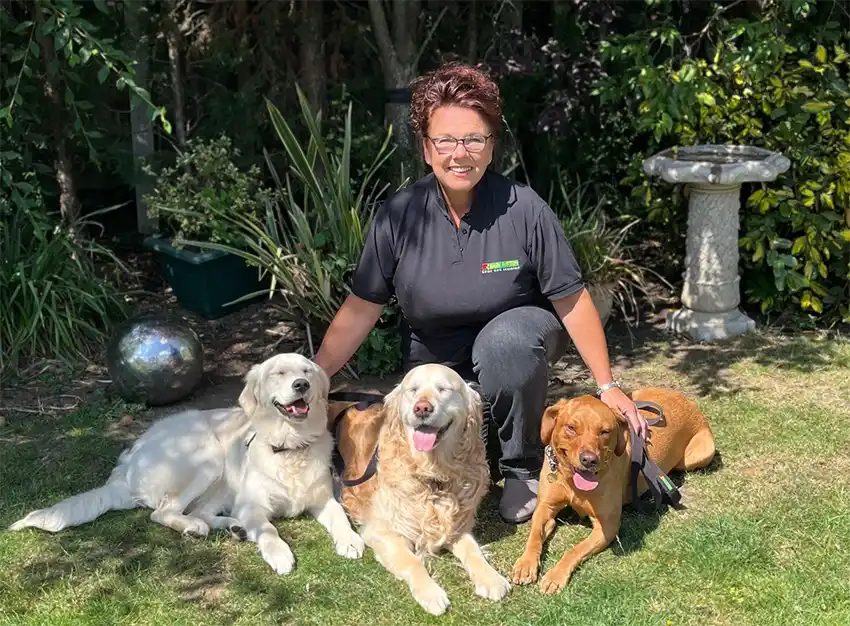The Ultimate Overview to Pet Training: Change Your Animal's Behavior
Reliable pet dog training is vital for fostering a harmonious partnership between pets and their proprietors. The ins and outs of canine habits and the implementation of organized training methods play an important role in this procedure. By comprehending the principles of positive support, consistency, and socializing, family pet owners can navigate usual difficulties that arise throughout training. This guide not only aims to furnish you with the required devices to transform your dog's behavior however also invites you to check out how these fundamental concepts can cause a much deeper link with your pet dog. What might be the very first step in this transformative journey?
Recognizing Dog Habits
Comprehending pet actions is important for efficient training and an unified connection in between pets and their proprietors. A dog's behavior is influenced by a combination of genetics, environment, and experiences. Dog training. Recognizing these elements enables owners to tailor their training approaches to meet the private demands of their pet dogs
Pets communicate mainly with body language, vocalizations, and facial expressions. A wagging tail can indicate exhilaration or joy, while a put tail may indicate worry or submission. Observing these cues enables proprietors to react properly, strengthening favorable habits and attending to unfavorable ones properly.
Additionally, recognizing the social structure of pets can supply insights right into their behavior. Pet dogs are pack pets, and they prosper in an organized atmosphere. Developing regular guidelines and clear borders can avoid complication and promote a feeling of security.
Moreover, recognizing the all-natural reactions of canines, such as the impulse to chase or dig, is crucial. These impulses can be rerouted via suitable outlets, such as play or workout. By comprehensively comprehending these behavioral elements, proprietors can cultivate a positive training experience, eventually causing a well-adjusted and obedient canine buddy.
Crucial Training Techniques
Efficient pet training relies upon a range of necessary strategies that can considerably boost the understanding process for both the canine and the owner. One basic technique declares reinforcement, which involves gratifying preferable habits with deals with, appreciation, or play. This approach urges pets to duplicate the behaviors that bring about favorable end results, fostering a trusting partnership between the pet and owner.
Another trick technique is uniformity in expectations and commands. Making use of the very same verbal cues and hand signals aids the pet comprehend what is called for, lowering complication and advertising quicker discovering. Furthermore, establishing clear borders and regulations is critical for reliable interaction.
Socialization is likewise an essential component of training. Revealing pets to various atmospheres, individuals, and various other animals helps them create ideal social skills and lowers anxiety in strange circumstances.
Finally, patience and timing are crucial. Training sessions should be quick however frequent, making sure that the canine continues to be engaged and receptive. By utilizing these necessary techniques, proprietors can create a organized and positive training experience that promotes etiquette and enhances the bond with their canine companions.
Developing a Training Set Up
Exactly how can a well-structured training schedule improve a dog's learning experience? A training schedule offers uniformity, guaranteeing that pets get routine, focused guideline. This predictability assists pets understand what is expected of them, enhancing their understanding and enabling for far better retention of habits and commands.
When developing a training schedule, it is important to consider the pet's age, breed, and private character. Young young puppies may take advantage of much shorter, much more regular sessions, while grown-up pets may love longer, much less frequent training durations. Including a selection of activities can likewise keep the sessions involving, avoiding monotony and promoting interest for understanding.
Additionally, scheduling training sessions at specific times of the day can help solidify a routine. Combining training with day-to-day strolls or play can produce a favorable organization with discovering. It is likewise critical to consist of time for support, such as deals with or praise, to compensate wanted actions without delay.
Last but not least, adaptability is vital. While uniformity is crucial, being adaptable to the canine's mood or energy degree can improve their learning experience. A well-crafted training schedule inevitably lays the structure for efficient communication and a stronger bond in between the pet and proprietor.
Typical Training Challenges
Regardless of having a well-structured training timetable, pet dog owners frequently experience various difficulties during the training process. One usual problem is variance in cues and commands. When several relative use various terms or tones, a canine may end up being baffled, hindering its capacity to learn successfully.
An additional frequent obstacle is diversion. Dog training. Pet dogs are normally curious creatures, and external stimulations such as other pets, sounds, or people can divert their focus throughout training sessions. This needs proprietors to create a controlled environment or gradually introduce diversions to reinforce emphasis
Furthermore, varying energy degrees can impact training end results. High-energy canines may battle to settle and focus, while more laid-back breeds may need additional motivation to engage. Customizing the training technique to fit the specific dog's personality is essential for success.

Structure a Strong Bond
A solid bond between a pet dog and its owner is important for successful training and general well-being. Dog training. This partnership promotes you can try here trust, which is crucial for effective interaction during the training process. When a pet dog feels connected and safe to its proprietor, it is most likely to react favorably to hints and commands
To develop this bond, uniformity is essential. Developing a routine that includes normal feeding, exercise, and training sessions aids find out here create a sense of stability. Furthermore, positive reinforcement strategies, such as treats, appreciation, and play, enhance desired actions while reinforcing the emotional connection.
Socialization is another essential aspect of bond-building. Exposing your pet dog to different atmospheres, individuals, and other pets helps them really feel a lot more comfortable and positive, boosting the bond with their owner. Involving in activities together, such as strolling, playing bring, or taking part in obedience training, promotes team effort and shared pleasure.
Final Thought

Comprehending canine actions is essential for efficient training and a harmonious relationship between canines and their proprietors.Efficient dog training relies on a variety of necessary techniques that can significantly boost the learning procedure for both the canine and the proprietor.Regardless of having a well-structured training schedule, canine proprietors commonly experience various obstacles throughout the training procedure.In final thought, reliable pet training depends on a comprehensive understanding of canine actions, the application of essential methods, and the establishment of an organized training timetable. By stressing favorable reinforcement and consistency, dog owners can substantially enhance their pets' actions, eventually ensuring a harmonious connection and promoting the health of both the dog and its atmosphere.